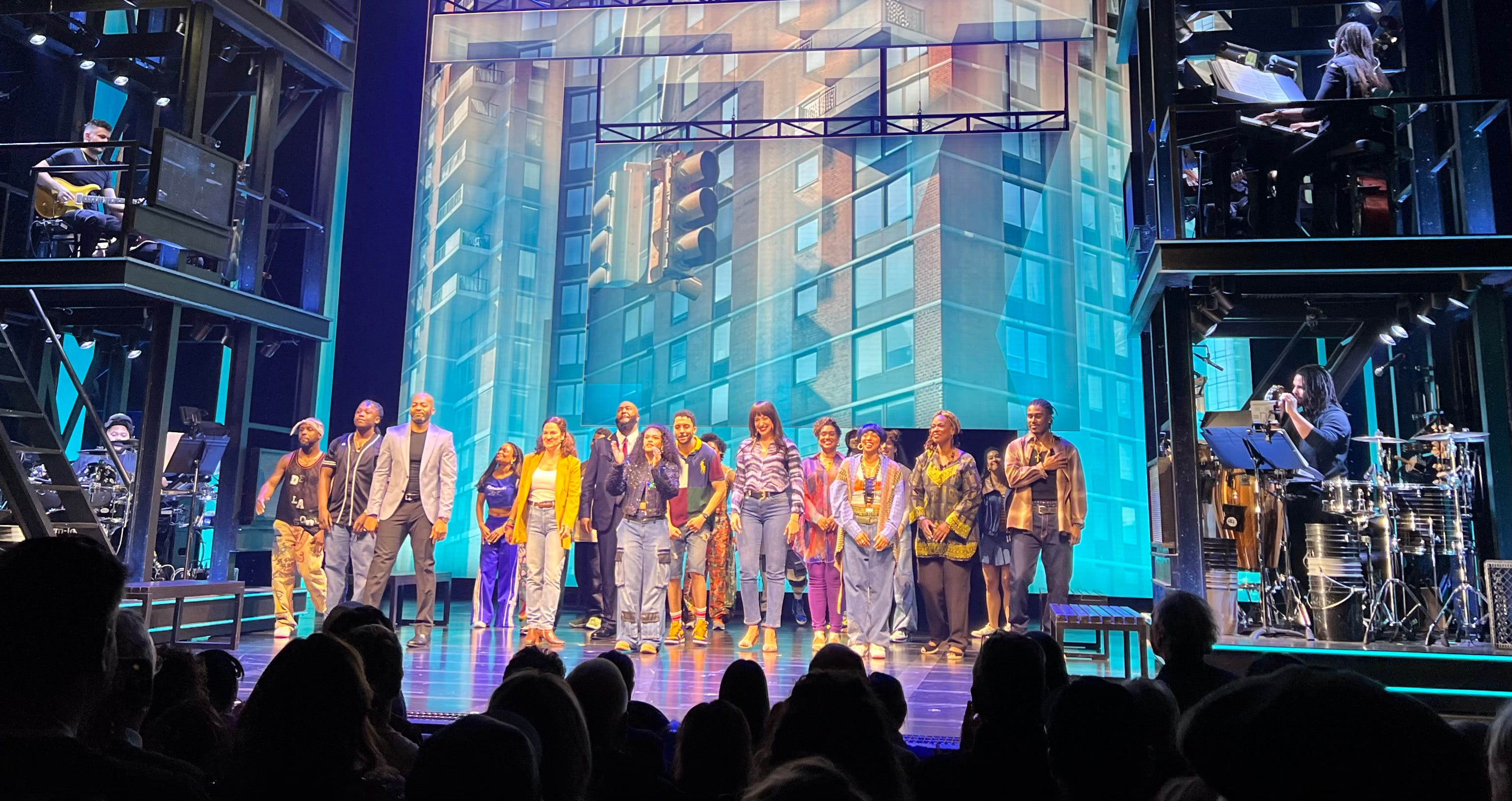Up From the Neighborhood: "HELL'S KITCHEN"
Hell’s Kitchen hit me right where my friends used to live. Almost everyone I knew in the theater was living in and around Hell’s Kitchen in the early ‘80s. The walkups were cheap, the playhouses and rehearsal studios were nearly next door, and the living was easy.
Hell’s Kitchen, the delightful new Alicia Keys musical, captures that Hell’s Kitchen sense of place with rapturous fidelity. The building, Manhattan Plaza, where Keys grew up is an active character in her show, perhaps the dominant character — as it was, and remains, a dominant character in the actual neighborhood. Occupying the block from 42nd to 43rd Streets, Ninth to Tenth Avenues, Manhattan Plaza opened in 1977, offering federally subsidized apartments for artists only. The waiting list was long but I know a bunch of people who eventually got in. Some of them are still there.
The essence of community that Hell’s Kitchen invokes is one of the show’s many native delights, beautifully encapsulated by the resident music-making that resounds, floor to floor, as the Manhattan Plaza elevator doors open and close for Keys’ lead character (and surrogate), 17-year-old Ali, living in a Manhattan Plaza apartment with her single mother — as Alicia Keys did.
Though the dangers of the Hell’s Kitchen streets are a central theme of the show — fearfully over-projected by Ali’s overprotective mom — those streets were way more dangerous when my pals and I were running around. This is not remotely a criticism of Hell’s Kitchen, just a simple fact: by young Alicia Keys’ time in the 1990s the neighborhood was already on an upswing, largely because of the tremendously positive impact of Manhattan Plaza.
Anyone remember The Westies? The Westies were scary — an Irish crime gang from the Hell’s Kitchen streets who partnered with the Mafia and terrorized the neighborhood through the 1980s, beating up and even murdering in broad daylight, exacting “protection” from small businesses like my friend Steve Olsen’s West Bank Cafe; still a fixture at the base of Manhattan Plaza on the 42nd Street side, having survived the Westies and a whole lot more.
There are no Westies in Hell’s Kitchen, the musical. The Westies lacked even a scrap of West Side Story-ish elan. Dancing with the Westies would have been a very bad idea.
The streets of Hell’s Kitchen, the musical, are prowled solely by lithe young dancers, a passel of neighborhood kids who never stop moving, illuminating and underscoring gloriously every line, seemingly, of the show. The choreography, by the remarkable Camille A. Brown is extravagantly original. It shimmies and ponies and breaks in disjointed unison, like a Bob Fosse “blob” but more spiritual in its editorializing; always an ensemble yet utterly individuated, every dancer a universe unto themselves. They make Hell’s Kitchen pulsate and levitate.
I’ve always admired Alicia Keys from a distance. I appreciated her talent as both a singer and, especially, as a songwriter, but her pop sheen never touched me much. How marvelous to hear her songs repurposed eloquently as musical theater moments. I loathe jukebox musicals almost universally so I was as surprised as you must be to find myself loving Hell’s Kitchen musically. The bookwriter, Kristoffer Diaz, has done exemplary carpentering work, joinering these songs into place quite jointlessly, in service to the Keys-derived story of an achingly gifted, rebellious daughter, her smotheringly adoring mother, their dissolution and ultimate reconciliation.
The score is an impressive recombinant affair, preserving the sonic tone of Keys’ original hits while theatrically enhancing them, co-orchestrated by Tom Kitt — Tony and Pulitzer-Prize-winning composer, arranger and orchestrator of the musical Next to Normal, among many others — in collaboration with Adam Blackstone — music director of Super Bowl halftime shows and grandiose pop concert spectacles — which gives you a notion of the heavy lifting that has gone into alchemizing Hell’s Kitchen into a Broadway musical.
All those Keys hits, like “Fallin’,” “You Don’t Know My Name” “If I Ain’t Got You” “Girl On Fire” “Like You’ll Never See Me Again” “No One,” “Empire State of Mind,” finally hit me deep and hard, as sung by Hell’s Kitchen’s exceptional cast, led by the staggering Kecia Lewis, giving the performance of a lifetime as Miss Liza James, Ali’s inspiration; her piano teacher at Manhattan Plaza. Shoshana Bean sings her heart out and is a total pain, as Ali’s mom. Brandon Victor Dixon goes from charm to smarm in a heartbeat, smooth as silk, as Ali’s absent jazzman dad.
I had an opportunity to appreciate Hell’s Kitchen’s cast from an interesting angle. The night I first saw the show was a press preview. Despite this, two of the leads were out: Maleah Joi Moon, the preternaturally gifted, some predict Tony Award shoo-in, as Ali; and Chris Lee, her love interest as a street drummer named Knuck. Ultimately, at the show’s invitation, I returned a few weeks later to enjoy Ms. Moon and Mr. Lee, as intended. But I want to tell you, the understudies I was privileged to catch: Gianna Harris and Lamont Walker III (who is also an Ensemble member, normally playing Knuck’s buddy, ‘Riq) were both electrifying — delivering spot-on impressions, obviously, of the stars they were covering for, but with such chemistry and heat! The cast, moreover, seemed fired up by their presence and delivered a performance dialed up a notch or two from the perfectly adequate subsequent show I witnessed upon my return. No harm, no foul, the two leads, Moon and Lee, are excellent, as advertised. But here’s to the always under-celebrated wonderfulness of understudies.
Their stand-in achievement embodies the wonder of Alicia Keys’ Hell’s Kitchen, whose streets are just teeming with talent. Give them a shot — and watch them go.




